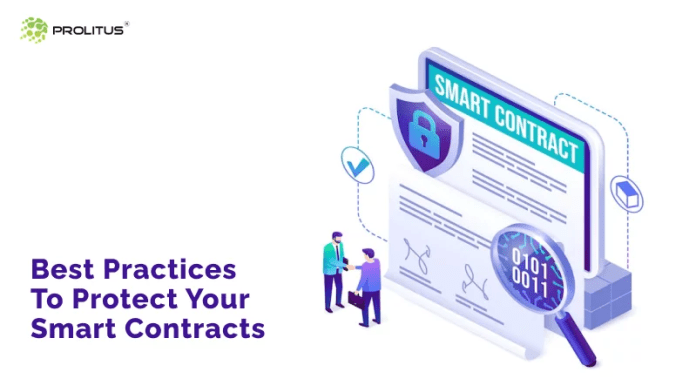Introduction to Smart Contracts:
Smart contracts are self-executing contracts that run on a blockchain. They are essentially computer programs that are designed to automatically execute and enforce the terms of a contract when certain conditions are met. Smart contracts have the potential to revolutionize the way we do business, by automating many of the processes that are currently done manually, and reducing the need for intermediaries such as lawyers and banks.
The Importance of Smart Contract Development Best Practices:
In this section, you will learn about smart contract best practices.
Smart contract development is a complex process that requires careful planning, coding, and testing. Best practices are essential to ensure that smart contracts are secure, reliable, and compliant with legal and regulatory requirements. Failure to follow best practices can lead to costly mistakes, including loss of funds, legal disputes, and damage to reputation.
The Do’s of Smart Contract Development:
a. Plan and document your smart contract:
Before you start coding your smart contract, you should have a clear understanding of the problem you are trying to solve and the requirements for your contract. It is also important to document your smart contract, including the purpose, functions, and parameters.
b. Use secure development methodologies:
Secure development methodologies such as the Secure Software Development Lifecycle (SSDL) can help you identify and mitigate potential security risks in your smart contract. You should also follow coding standards and best practices such as the Solidity Style Guide.
c. Test thoroughly:
Thorough testing is essential to ensure that your smart contract is secure and performs as expected. You should test your smart contract using both automated and manual testing methods, including functional testing, security testing, and performance testing.
d. Monitor and update smart contract:
Smart contracts are not set-and-forget systems. You should monitor your smart contract for errors, vulnerabilities, and performance issues, and update it as needed to ensure that it continues to function properly.
e. Follow legal and regulatory compliance:
Smart contracts should comply with relevant legal and regulatory requirements. You should consult with legal experts to ensure that your smart contract is compliant with applicable laws and regulations.
The Don’ts of Smart Contract Development:
a. Don’t use untested code:
Using untested code can lead to vulnerabilities and security risks in your smart contract. You should always test your code thoroughly before deploying it on a blockchain.
b. Don’t rely on centralized data sources:
Centralized data sources can introduce a single point of failure in your smart contract. You should consider using decentralized data sources such as oracles or distributed ledger technology to reduce the risk of data manipulation or tampering.
c. Don’t neglect to consider edge cases:
Edge cases are scenarios that are not commonly encountered but can still occur. Neglecting to consider edge cases can lead to unexpected behavior in your smart contract. You should consider all possible scenarios when designing and testing your smart contract.
d. Don’t deploy a smart contract without proper auditing:
Smart contracts should be audited by security experts to identify and mitigate potential security risks. Failure to conduct a proper audit can result in vulnerabilities and security breaches.
Common Smart Contract Development Mistakes and How to Avoid Them:
Some common mistakes in smart contract development include using untested code, neglecting to consider edge cases, and failing to conduct a proper audit. You can avoid these mistakes by following best practices such as thorough testing, secure coding methodologies, and proper auditing.
Security Considerations for Smart Contract Development:
- Code vulnerabilities and attack vectors:
Smart contracts can be vulnerable to a range of attack vectors, including reentrancy attacks, integer overflow attacks, and denial-of-service attacks. You should follow secure coding practices and conduct security testing to identify and mitigate potential vulnerabilities.
- Implementing secure data storage and transfer:
Smart contracts should implement secure data storage and transfer mechanisms to protect sensitive information from unauthorized access or manipulation. You should consider using encryption, access controls, and other security measures to protect data.
- Securing access control mechanisms:
Access control mechanisms in smart contracts should be implemented securely to prevent unauthorized access and manipulation. You should consider using multi-factor authentication, role-based access controls, and other security measures to protect access to critical functions.
- Handling exceptions and fallback mechanisms:
Smart contracts should have robust exception handling and fallback mechanisms to ensure that they continue to function even in the event of errors or unexpected behavior. You should consider using error handling functions and implementing fallback mechanisms to ensure the continuity of your smart contract.
Tools and Resources for Smart Contract Development:
a. Smart contract development frameworks:
Smart contract development frameworks such as Truffle, Embark, and Remix provide a range of tools and resources to help you develop and test smart contracts more efficiently.
b. Code analysis and auditing tools:
Code analysis and auditing tools such as Mythril, Oyente, and SmartCheck can help you identify and mitigate potential security risks in your smart contract code.
c. Security libraries and modules:
Security libraries and modules such as OpenZeppelin provide pre-built code components that can help you implement security best practices more easily in your smart contracts.
d. Community resources and support:
The blockchain and smart contract development communities offer a wealth of resources and support, including forums, chat rooms, and online tutorials. You should consider leveraging these resources to stay up-to-date on best practices and to get help with specific technical issues.
Conclusion: Best Practices for Smart Contract Development
Smart contract development is a complex process that requires careful planning, coding, and testing. Best practices such as secure coding methodologies, thorough testing, and proper auditing are essential to ensure that smart contracts are secure, reliable, and compliant with legal and regulatory requirements. By following best practices and leveraging available tools and resources, you can develop smart contracts that help revolutionize the way we do business, while minimizing the risks associated with this emerging technology.
